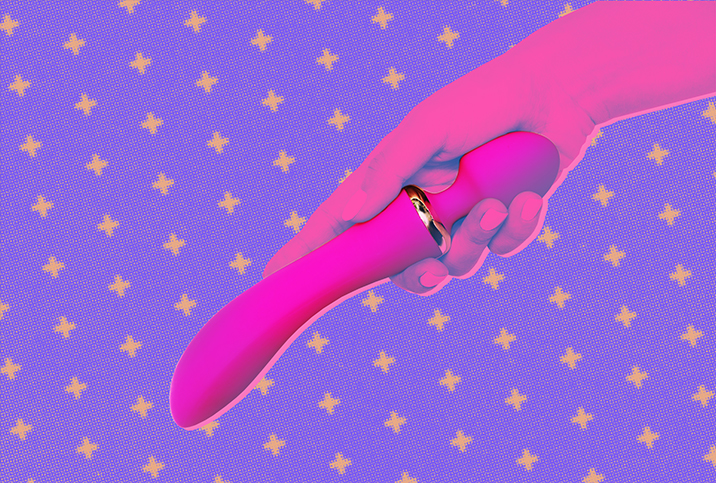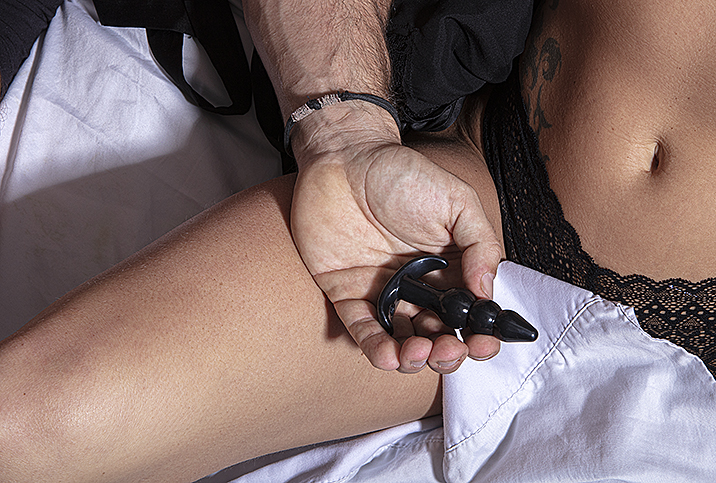It's Official: Sex Toys Are Good for You

Dildos. Vibrators. Butt plugs. Masturbation sleeves. Penis rings.
Sex toys such as these are tools to increase pleasure in the bedroom, but did you know there may be physical and psychological health benefits to them, as well?
Sex toys and tools can be used to treat a host of conditions, for example, providing relief from conditions such as vaginismus—involuntary tensing or contracting of the vaginal muscles—and chronic pelvic pain. Men may use sex toys and devices to treat prostatitis, premature ejaculation and erectile dysfunction (ED).
While there's not much scientific research on the health benefits of sex toys, the anecdotal evidence is compelling, according to Rainey Horwitz, a fourth-year medical student and aspiring urologist at Saint Louis University School of Medicine.
"I think there's a lot of bad press that sex tools are a replacement for someone's partner and that's just simply not the case," said Horwitz, who founded the Instagram sexual health account sexplained.med. "If anything, it's an augmentation and assistance to enhance everyone's time."
Horwitz said sex toys can curb performance anxiety and may prolong sex.
"Sex tools can kind of expand our definition of sex and what it means to experience pleasure," she said. "It doesn't have to be a penetrative penis-in-vagina kind of thing."
Physical benefits for women
Horwitz has found vibrators, which may temporarily desensitize nerve endings, to be useful for women with pelvic pain issues, though effectiveness depends on the individual. For women with anorgasmia (difficulty reaching orgasm), especially those who may have never had an orgasm, Horwitz recommended air pressure toys, which may be marketed as suction toys. For folks experiencing menstrual pain, a sex toy might bring relief because of the rush of feel-good hormones we get from sexual stimulation, Horwitz said.
For pain related to tense, tight muscles—which can be caused by conditions such as vaginismus and vulvodynia—vaginal dilators can condition tight muscles by gently stretching the vagina, according to sex and pleasure educator Luna Matatas, who works in Canada. Horwitz noted dilators may be especially useful for women who have had radiation therapy for gynecologic cancer or have anatomical issues.
Matatas noted another important accessory that can ease insertion: lube. Using a quality vaginal lubricant can help create less friction and less anticipation of a painful experience, Matatas said. However, as Horwitz mentioned, making sure the lubricant is compatible with a condom or sex toy is critical. Silicone lubes, for example, cannot be used with silicone sex toys because they can cause the toy to deteriorate.
It's important to keep in mind that vaginal penetration is not necessary for pleasure or for orgasm.
"You can enjoy sex toys like clitoral stimulators, butt plugs and wand-style vibrators," Matatas said. "Bigger, insertable toys like dildos or vibrators are not necessarily better for pleasure. Trying out slimmer, softer and smoother sex toys can also bring internal pleasure when there is also discomfort."
Physical benefits for men
For men, Matatas said sex toys open up possibilities for pleasure beyond erections and penile-vaginal intercourse.
"Sex toys can be an extension of you to your partner," she explained. "For example, strap-on harnesses exist for people with penises who want to maintain penetration with their partner or keep penetration going after ejaculation."
Penis rings, also called cock rings depending on where you shop, can help men sustain erections safely. Some even include vibrators for extra stimulation for both the penetrating partner and the receiving partner. No matter the bells and whistles, Horwitz recommended using flexible cock rings, not metal ones.
For a new sensory experience, especially to change up the masturbation experience, she suggested textured strokers.
"There are some disposal ones and some have certain cleaning protocols you use," Horwitz said.
Overall, the goal isn't to try a specific kind of toy but just to try something new.
"Changing up your masturbation to include sex toys can help you discover more nuances about the hot spots for pleasure on the penis, expand sensitivity to different types of sensation and help you slow things down," Matatas explained.
Additionally, sex toys are a great aid to prepare for partnered sex in the future.
"Practicing edging with sex toys is a great way to improve control over ejaculation," Matatas said, referring to the practice of stopping stimulation and starting again to delay ejaculation.
For an erogenous zone that's not dependent on direct penis stimulation, or to complement it, Matatas suggested prostate-stimulating toys. Horwitz particularly highlighted vibrating and glass wands for prostate massage. However, she also recommended talking with your doctor if you have a history of chronic prostatitis.
"Let them know that's something you're interested in just so they're aware when they're doing their history and physical," she said.
What are the psychological benefits?
Even if you're using toys alone, Matatas said getting to know your body helps you feel more comfortable and more informed when you're with a partner.
"Sex toys are a great way to get to know your body without worrying about your partner, feeling rushed or having performance anxiety," she added. "Sex toys can create sensations that promote arousal and orgasm; sensations that mouths or hands or other body parts might not be able to do."
This practice can build confidence and reduce anxiety about taking too long to orgasm or not achieving orgasm at all.
Matatas also pointed out that ED can stem from mental and emotional challenges such as stress, trauma and anxiety. Sex toys may help reduce these negative emotions during sexual activity.
"The more relaxed you are and the more you can let go of orgasm and focus on sensations and pleasure, the more your body will relax and be more receptive to sensations and arousal," she said.


















